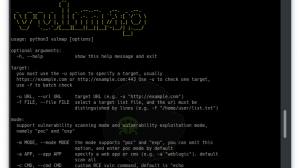Wfuzz is a tool designed for bruteforcing Web Applications, it can be used for finding resources not linked (directories, servlets, scripts, etc), bruteforce GET and POST parameters for checking different kind of injections (SQL, XSS, LDAP,etc), bruteforce Forms parameters (User/Password), Fuzzing,etc.
Features
- Multiple Injection points capability with multiple dictionaries
- Recursion (When doing directory bruteforce)
- Post, headers and authentication data brute forcing
- Output to HTML
- Colored output
- Hide results by return code, word numbers, line numbers, regex.
- Cookies fuzzing
- Multi threading
- Proxy support
- SOCK support
- Time delays between requests
- Authentication support (NTLM, Basic)
- All parameters bruteforcing (POST and GET)
- Multiple encoders per payload
- Payload combinations with iterators
- Baseline request (to filter results against)
- Brute force HTTP methods
- Multiple proxy support (each request through a different proxy)
- HEAD scan (faster for resource discovery)
- Dictionaries tailored for known applications (Weblogic, Iplanet, Tomcat, Domino, Oracle 9i,
- Vignette, Coldfusion and many more.i (Many dictionaries are from Darkraver’s Dirb, www.open-labs.org)

Wfuzz has been created to facilitate the task in web applications assessments and it is based on a simple concept: it replaces any reference to the FUZZ keyword by the value of a given payload.
A payload in Wfuzz is a source of data.
This simple concept allows any input to be injected in any field of an HTTP request, allowing to perform complex web security attacks in different web application components such as: parameters, authentication, forms, directories/files, headers, etc.
Wfuzz is more than a web content scanner:
- Wfuzz could help you to secure your web applications by finding and exploiting web application vulnerabilities. Wfuzz’s web application vulnerability scanner is supported by plugins.
- Wfuzz is a completely modular framework and makes it easy for even the newest of Python developers to contribute. Building plugins is simple and takes little more than a few minutes.
- Wfuzz exposes a simple language interface to the previous HTTP requests/responses performed using Wfuzz or other tools, such as Burp. This allows you to perform manual and semi-automatic tests with full context and understanding of your actions, without relying on a web application scanner underlying implementation.
Platforms:
wfuzz was tested on Linux, Os X and Windows.
On windows the colored output doesn’t work, we are working towards fixing this problem.
Dependencies:
- pycurl library to perform HTTP requests.
- pyparsing library to create filter’s grammars.
- JSON.miniy (C) Gerald Storer to read json recipes.
Example:
wfuzz.py -c -z file -f commons.txt --hc404 --html http://www.mysite.com/FUZZ
This will bruteforce the site http://www.mysite.com/FUZZ in search of resources (directories, scripts, files,etc), it will hide from the output the return code 404 (for easy reading the results), it will use the dictionary commons.txt for the bruteforce.





















Add Comment